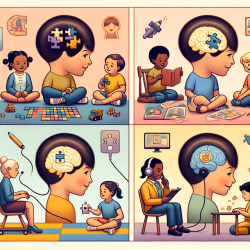As a speech-language pathologist, you are constantly seeking ways to enhance your practice and deliver better outcomes for your clients. The study "Performance of Young, Middle-Aged, and Older Adults on Tests of Executive Function" provides valuable insights that can be applied to your work, especially when working with children through online therapy platforms like TinyEYE.
Executive function encompasses a range of cognitive processes such as initiating tasks, forming goals, problem-solving, and organizing information. These skills are crucial for effective communication and daily functioning. The study by Burda et al. (2017) sheds light on how executive function varies across different age groups, and these findings can be instrumental in refining your therapeutic strategies.
Key Findings from the Study
- Older adults scored significantly lower on tests of executive function compared to young and middle-aged adults.
- No significant differences were found between young and middle-aged adults.
- The tests used in the study were the Behavioural Assessment of Dysexecutive Syndrome (BADS) and the Functional Assessment of Verbal Reasoning and Executive Strategies (FAVRES).
These results suggest that executive function declines with age, which is consistent with previous research. However, it's crucial to note that the study's findings are based on healthy adults, and further research is needed to understand the full spectrum of executive function across the lifespan.
Implications for Online Therapy with Children
While the study focuses on adults, its findings can indirectly inform your approach to working with children. Here are some ways you can leverage this information:
- Early Assessment: Regularly assess executive function in children to identify any early signs of cognitive difficulties. Early intervention can lead to better outcomes.
- Age-Appropriate Strategies: Tailor your therapeutic strategies based on the child's age and developmental stage. Younger children may benefit from more structured activities, while older children can handle more complex tasks.
- Parental Involvement: Educate parents about the importance of executive function and how they can support their child's cognitive development at home.
Encouraging Further Research
While this study provides valuable insights, it also highlights the need for further research, particularly in understanding how executive function develops and changes in children. As a practitioner, staying updated with the latest research can help you provide the best possible care.
Consider collaborating with researchers or participating in studies that focus on executive function in children. This can not only enhance your knowledge but also contribute to the broader field of speech-language pathology.
To read the original research paper, please follow this link: Performance of Young, Middle-Aged, and Older Adults on Tests of Executive Function.










